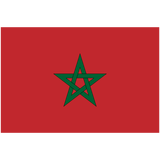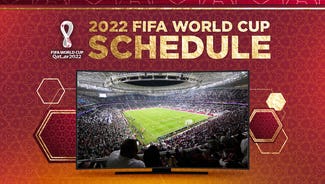
US has FIFA edge over risky Morocco in 2026 World Cup vote
MOSCOW (AP) If the football federations follow FIFA's guidance, the 2026 World Cup should be awarded to the North American bid on Wednesday.
Success for Morocco relies on the electorate to follow the trend of recent hosting decisions and vote for a risky bid facing doubts about the ability to pull off the vast reconstruction project required to stage soccer's showpiece.
The 16 stadiums proposed by the joint United States-Canada-Mexico bid already exist and only need minor upgrades over eight years.
All 14 Moroccan venues must be built or renovated as part of the $16 billion investment in new infrastructure the African nation says is required.
FIFA's inspection reports highlighted three ''high-risk'' elements to Morocco's bid: stadiums, hotels and transport.
When FIFA President Gianni Infantino last week urged the more than 200 voting federations to ''look at the report,'' it seemed a clear signal of the governing body's preference for security and stability offered the in North America.
A consequence of concerns expressed about the 2010 contest that resulted in hosting rights awarded to Russia for 2018 and to Qatar for 2022 was a more rigorous bidding process that required candidates to produce human rights strategies.
Morocco's bid was singled out for ''unexplored risks'' in evaluations of those strategies that were produced by the BSR organization for FIFA.
In the evaluation, BSR said the Moroccan bid documents ''lack consideration of topics highlighted as potential human rights risks in key international documents covering mega sporting events.''
BSR expressed apprehension about ''discrimination against LGBTQ,'' a reference the Moroccan law that criminalizes homosexuality.
Qatar's World Cup preparations have been dogged by concerns about working conditions on stadiums, which could make voting members nervous considering a Moroccan victory would require years of extensive building work on stadium or training facilities.
An ''assessment of risks associated with working conditions is insufficiently developed,'' BSR said, ''and does not provide detailed information on risks associated specifically with health and safety, working hours, wage, and the prevalence of informal economy in the country.''
Morocco's bid proposes completing a 93,000-capacity Grand Stade de Casablanca one year before the World Cup kicks off. Several of its 14 venues would meet the World Cup minimum 40,000-capacity, then be scaled back to 25,000 after the tournament. In a pitch to voters in Moscow this week justifying the vast infrastructure required, Morocco tourism minister Lamia Boutaleb talked of needing to create jobs in her country ''to reach the next level.''
The joint bid from North America offers a choice from 23 stadiums including three each in Canada and Mexico, which are each scheduled to host 10 games. The United States would stage 60 games, and the 87,000-capacity MetLife Stadium near New York is proposed for the final.
Here's a closer look at the bids:
MONEY
The big numbers for projected budgets, revenues and profits used in World Cup and Olympic bidding are best treated with caution.
FIFA foresaw at least $1.76 billion from North American estimates of selling 5 million match tickets. However, that would have to cover $390 million in expected stadium rental fees. Hospitality sales are predicted at $1.3 billion.
Morocco's combined tickets and hospitality revenue would be $1.07 billion, according to FIFA analysis. Free use of stadiums is promised.
Morocco topped only one of the nine categories scored by FIFA - offering lower tournament running costs due to planning for 14 stadiums in only 12 cities compared with a 16-stadium, 16-city project in three countries.
On broadcast rights income for FIFA, Morocco stresses its sweet spot in a time zone that's good for European and African viewers.
Picking the North Americans would earn FIFA $300 million in bonuses from broadcasters, including Fox and Telemundo, who already secured 2026 rights three years ago before knowing if it would be a ''home'' tournament. FIFA awarded those in a no-tender process to avoid legal action for moving the 2022 tournament dates in Qatar from the middle to the end of the year.
POLITICS
A World Cup vote always has real world politics factored in.
President Donald Trump's attempted travel ban targeting some Muslim-majority countries, and some comments that offended African and Central American countries, framed some of the early 2026 campaigning.
Although FIFA vice president Sandor Csanyi on Tuesday said ''I think there is no anti-United feeling.''
In recent weeks, Trump publicly reminded traditional U.S. allies he is watching who they support when FIFA publishes each national football federation's pick after the vote.
The Western Sahara issue also arose in campaigning, with some voters reminded that Morocco annexed the former Spanish colony in 1975. The Polisario Front liberation movement aims to end Morocco's presence there.
''Football people have to stay away from non-football reasons (to vote),'' said Estonia football president Aivar Pohlak, who is a FIFA ethics committee judge.
TRANSPORT
North America's bid is spread over four time zones and will necessitate air travel for a large percentage of traveling fans, and FIFA's panel was unimpressed with some city public transport services.
Morocco promises fans can move around the country by road or train in a single time zone aligned with big European television markets. FIFA's panel classed as ''medium risk'' Morocco's plans for ''a very large number of ambitious'' transport projects by 2026.
VOTING
Though FIFA voters rarely reveal their intentions in advance, the North Americans appear to have enough momentum to carry the 104 votes which would guarantee a first-ballot victory.
With FIFA rules denying the candidate countries a vote, and Kosovo expected to be absent, 206 of FIFA's 211 member federations should take part. Previously, FIFA's elected board members chose World Cup hosts in private.
---
AP World Cup coverage: www.apnews.com/tag/WorldCup






































































































































